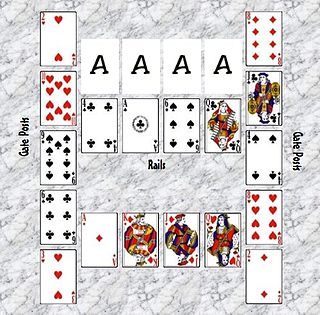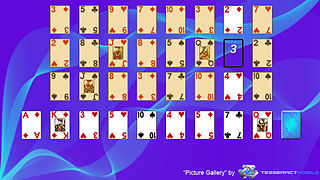
Games of patience, or (card) solitaires as they are usually called in North America, have their own 'language' of specialised terms such as "building down", "packing", "foundations", "talon" and "tableau". Once learnt they are helpful in describing, succinctly and accurately, how the games are played. Patience games are usually for a single player, although a small number have been designed for two and, in rare cases, three or even four players. They are games of skill or chance or a combination of the two. There are three classes of patience grouped by object.

Klondike, also known as Canfield, is a card game for one player and the best known and most popular version of the patience or solitaire family, as well as one of the most challenging in widespread play. It has spawned numerous variants including Batsford, Easthaven, King Albert, Thumb and Pouch, Somerset or Usk and Whitehead, as well as the American variants of the games, Agnes and Westcliff. The distinguishing feature of all variants is a triangular layout of the tableau, building in ascending sequence and packing in descending order.

Yukon is a type of patience or solitaire card game using a single deck of playing cards like Klondike, but there is no deck or stock, and manipulation of the tableau works differently.
Gargantua is a patience or solitaire card game that is a version of Klondike using two decks. It is also known as Double Klondike.
Canfield (US) or Demon (UK) is a patience or solitaire card game with a very low probability of winning. It is an English game first called Demon Patience and described as "the best game for one pack that has yet been invented". It was popularised in the United States in the early 20th century as a result of a story that casino owner Richard A. Canfield had turned it into a gambling game, although it may actually have been Klondike and not Demon that was played at his casino. As a result it became known as Canfield in the United States, while continuing to be called Demon Patience in the United Kingdom and elsewhere. It is closely related to Klondike, and is one of the most popular games of its type.

Agnes is a patience or solitaire card game that emerged in England about the same time as Klondike appeared in the US. The classic version has the unusual feature of packing in colour, a feature it shares with Whitehead. By contrast, the later American variant appears to have been influenced by Klondike with packing is in alternate colours. The classic game has been described as the best single-pack patience yet invented.

Baker's Dozen is a patience or card solitaire using a single pack of fifty-two playing cards. The game is so called because of the 13 columns in the game, the number in a baker's dozen.
Sir Tommy, also called Old Patience, is a patience or solitaire card game using a single pack of 52 playing cards. It is said to be the ancestor of all patiences, hence its alternative title. It is a half-open, planner type of patience game in the same family of card-building games as Calculation and Strategy. It is also known as Try Again and Numerica. Ednah Cheney (1869) calls it Solitaire and says "it is the simplest form of patience".
Tournament is a patience or solitaire card game which uses two decks of playing cards shuffled together. It is a variant of the much older game of Napoleon's Flank or Nivernaise and was first known as Maréchal Saxe.
Capricieuse is an old English patience played using two packs of playing cards. Some authors call it Capricious.
Westcliff is the name of two closely related patience or card solitaire games of the simple packer type, both of which are played using a deck of 52 playing cards. One version is particularly easy to win, with odds of 9 in 10; the other is harder with odds closer to 1 in 4. The game has a variant, Easthaven.
Napoleon's Square is a patience or solitaire card game which uses two decks of playing cards. First described in a revised edition of Lady Cadogan's Illustrated Games of Patience or Solitaire in the early 1900s, it is an easy variation of Napoleon at St Helena. It is not determined if Napoleon actually played this game, or any solitaire game named after him.
Deuces or Twos is a patience or card solitaire game of English origin which is played with two packs of playing cards. It is so called because each foundation starts with a Deuce, or Two. It belongs to a family of card games that includes Busy Aces, which is derived in turn from Napoleon at St Helena.
Amazons is an old patience or card solitaire game which is played with a single deck of playing cards. The game is played with a Piquet pack minus the kings or a standard 52-card pack that has its twos, threes, fours, fives, sixes, and kings removed. This game is named after the female-led tribe, the Amazons, because the queen is the highest card, and all queens are displayed if the game is won.
Duchess of Luynes is a patience or card solitaire game played with two packs of playing cards. It is a member of the Sir Tommy family. A unique feature of this game is the building of the reserve, which is not used until the entire stock runs out.

Four Seasons is a patience or card solitaire which is played with a single deck of playing cards. It is also known as Corner Card and Vanishing Cross, due to the arrangement of the foundations and the tableau respectively. Another alternate name is Cross Currents.
Fortress is a patience or solitaire card game which is played with a deck of playing cards, in which the entire deck is laid out. It is a member of the Castle family of solitaire games, but has two more tableau piles than Beleaguered Castle and the piles are shorter.

Fortune's Favor or Fortune's Favour is a patience or card solitaire which is played with a deck of 52 playing cards. It is so-called probably because the chances of winning are completely on the player's side. It is a significantly simplified version of the game Busy Aces, a member of the Forty Thieves family of solitaire games.

Gate is a patience or card solitaire game played using a pack of 52 playing cards, and is a member of the Canfield family. It gets its name because the cards are laid out in such a way that they form a gate. Average players can expect to win 99% of their games.

Royal Parade is an old, English, two-pack patience of the half-open builder type. The object of the game is to move cards to the foundations to create a 'gallery' full of picture cards.










